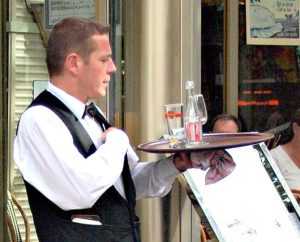What about gratuities? Do I leave anything for the waiter?
How about gratuities? Clients often ask me that simple question. Its a cultural difference that we sometimes don’t understand.
1- Gratuities or Tips are a personal choice that are always appreciated, but never taken for granted or expected. Unlike North America, tipping is not expected and it doesn’t go towards subsidizing an income that should have been taken care of by the employer. Italians are proud people and one mustn’t confuse gratuities with a hand-out.

The best way to know if you should leave a gratuity or not is to ask yourself the following question: Am I tipping because he or she provided an exceptional service and went above and beyond my expectations? If the answer is yes, then a token of appreciation can be left on the table. Nonetheless, it is not mandatory. It should be out the goodness of your heart and not what people will think if you don’t.
5 Things to Know About Dining in Italy
Know Who You Are Tipping
2- You never tip the owners of the business, such as in a restaurant, a salon, or mechanic. Nor you should give gratuities because you feel bad for that individual for doing his/her job. Again, Italians are proud, and if they feel you are tipping because they think that you feel sorry for them, then they may see this as an insult and just may refuse the tip. If they do refuse it for whatever reason, please don’t feel insulted. Understand it and move on. Don’t force it.
3- Waiters have a set salary, as well as tour guides. I would recommend a tip of appreciation for guides for showing you the sites. Taxi drivers are on salary so there is no need to tip. In any case, you just round the amount to the nearest Euro or so.

A Gift Goes Further
Bonus- In some circumstances, it’s more appropriate and also more appreciated to give someone a gift instead of money for having gone beyond the call of duty. That would be more for owners of businesses or maybe the manager or concierge of a hotel. If you stayed several nights there and they accommodated with concert tickets, museum passes or really good recommendations for restaurants, then consider it. If you take in a cooking class for instance as a token of appreciation such as a gift, it goes further than money since in most cases it’s the owner/chef that gave the course… And if the gift is from your country… better yet. Italians appreciate when individuals go out of their way to make them feel special or appreciated and sometimes money is not the only reward.
If you know that you may possibly be running in one of these situations, you could purchase something in your country and have it ready if needed on your travels. If someone really did something great for you, you can always send it once you returned home.
‘Til then…Buon viaggio.
Are you travelling to Italy and are interested in my assistance, or would like to comment on my post? Just drop a line below or contact me privately at info@italiabound.com.



